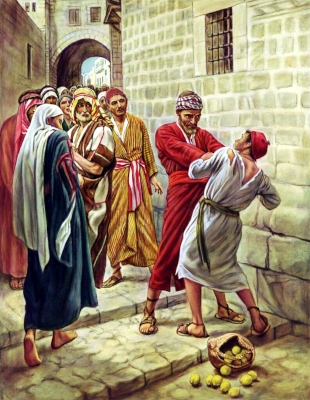As St. John Chrysostom says: “Antiochus surnamed Epiphanes, having invaded Judea and ravaged wholesale, forcing many Jews to give up the holy practices of their fathers, the Machabees remained steadfast and uncorrupted, amidst all these trials. Traversing the whole country they gathered together all the faithful and loyal citizens whom they met, and even a great number of those who had allowed themselves to be discouraged or led astray, urging them to return to the law of their fathers. These exhortations resulted in the raising of an army composed of men of the utmost bravery who were fighting not so much for their wives and children and servants; not to ward off slavery and ruin from their country, but for the faith of their fathers and the rights of their nation. God Himself was their leader. Moreover, when they went into battle to sacrifice their lives, this alone was enough to put the enemy to rout; in fact they trusted less in their arms than in the cause for which they had armed, which they considered sufficient to secure victory even if armour were altogether lacking. When on the march, they did not, like the people of some races, fill the air either with curses or profane songs; no flute players were to be found among them as in other camps; but they prayed God to send them aid from on high, to help and keep them, and to give them His strength, since they made war for His sake and not for their own glory” (Fourth Sunday in October, Second Nocturn). Christian life is a struggle for the glory of God and the salvation of His people. We must bring to this struggle, which is the duty of every Christian, the same fervour as was displayed by the Machabees, and remember, that for us, as for them, the faith of our fathers is at stake, the inheritance of our spiritual life which we ought to prize above all else. All these treasures, which we receive from God and, weak vessels that we are, bear in “vessels of clay,” are continually threatened by the forces of evil which war against God. The struggle, says St Paul, is not against men, but against the wicked spirits and their powerful, pernicious activity. And the Apostle calls on us to equip ourselves for this struggle with the arms of God (Epistle). The Introit of the Mass bids us be confident: “All things are in Thy will, O Lord; and there is none that can resist Thy will, for Thou hast made all things: heaven and earth and all things that are under the cope of heaven; Thou art the Lord of all.” The Gradual and Communion contain the same thoughts of unconquerable hope amidst terrible adversity: such untroubled petitions to almighty God, who is ready to help us, give us a feeling of confidence; even if we were required to undergo the sore trials encountered by Job, read by the Church a few weeks ago, which recur in to-day’s Offertory, like him we must remain faithful and, rather than despair, redouble our confidence in God. The Church, aware of the hard and bitter struggle that is our lot, puts magnificent prayers on our lips in which the urgency of the petitions is matched by the complete confidence with which they are uttered (see the three Prayers). Yet even with divine help we are too cowardly and too fickle to continue the struggle without ever flinching, and then more than ever we must call on God’s protection and have recourse to His mercy which, as the Gospel reminds us, is unlimited and can never fail us provided we pardon sincerely those who have offended us. (Saint Andrew Daily Missal with Vespers for Sundays and Feasts, by Dom Gaspar Lefebvre, O.S.B. of the Abbey of St. André, 1953) (Esth. 13:9-11) All things are in Thy will, O Lord; and there is none that can resist Thy will: for Thou hast made all things, heaven and earth, and all things that are under the cope of heaven: Thou art Lord of all. Ps. (118, 1) Blessed are the undefiled in the way; who walk in the law of the Lord. Gloria Patri. Lord, we pray Thee, keep Thy household the Church in continual godliness; that through Thy protection it may be free from all adversities, and devoutly given to good works, to the glory of Thy holy name. Through our Lord... Lesson of the Epistle of Saint Paul the Apostle to the Ephesians (6:10-17) (Ps. 89:1-2) Lord, Thou hast been our refuge from generation to generation. ℣. Before the mountains were made, or the earth and the world was formed; from eternity and to eternity Thou art God. Sequel of the holy Gospel according to Matthew (18:23-35) (Saint Andrew Daily Missal with Vespers for Sundays and Feasts, by Dom Gaspar Lefebvre, O.S.B. of the Abbey of St. André, 1953)Twentyfirst Sunday after Pentecost - The debtor

Table of Contents
Reflexions on the Liturgy of the Day
Like last Sunday’s, the lessons in the divine Office for this Sunday are often taken from the Book of Machabees.
Liturgy of the Mass
Introit
Collect
The Apostle speaks of a fight with unseen enemies, who beset us with fiery darts. It is a terrible struggle and we must be strongly armed if we are to “stand in all things perfect.” Like a soldier the Christian needs to be well girt, and well shod, with breastplate, shield, helmet and sword complete.Epistle
Brethren: Be strengthened in the Lord, and in the might of His power. Put you on the armour of God, that you may be able to stand against the deceits of the devil. For our wrestling is not against flesh and blood, but against principalities and powers, against the rulers of the world of this darkness, against the spirits of wickedness in the high places. Therefore, take unto you the armour of God, that you may be able to resist in the evil day, and to stand in all things perfect; stand therefore having your loins girt about with truth, and having on the breastplate of justice, and your feet shod with the preparation of the gospel of peace; in all things taking the shield of faith, wherewith you may be able to extinguish all the fiery darts of the most wicked one. And take unto you the helmet of salvation, and the sword of the Spirit which is the word of God.Gradual
Alleluia, Alleluia. ℣. (Ps. 113:1) When Israel went out of Egypt, the house of Jacob from a barbarous people. Alleluia. Alleluia.
“If,” says St Jerome, “we show ourselves implacable on account of injuries and refuse all attempts to make amends for a bitter word, do we not sentence ourselves to prison? God will treat us in accordance with the interior dispositions of our heart: if we do not forgive, neither will He. He is our Judge and He requires more than a mere outward forgiveness. Every one must forgive his brother ‘from his heart,’ if he himself hopes to be forgiven at the Last Day” (Matins). Gospel
At that time Jesus spoke to His disciples this parable: The kingdom of heaven is likened to a king, who would take an account of his servants. And when he had begun to take the account, one was brought to him that owed him ten thousand talents: and as he had not wherewith to pay it, his lord commanded that he should be sold, and his wife and children, and all that he had, and payment to be made. But that servant falling down, besought him saying: Have patience with me, and I will pay thee all. And the lord of that servant, being moved with pity, let him go, and forgave him the debt. But when that servant was gone out, he found one of his fellow-servants that owed him a hundred pence: and laying hold of him, he throttled him, saying: Pay what thou owest. And his fellow-servant falling down besought him, saying: Have patience with me, and I will pay thee all. And he would not; but went and cast him into prison till he paid the debt. Now his fellow-servants, seeing what was done, were very much grieved; and they came and told their lord all that was done. Then his lord called him, and saith to him: Thou wicked servant, I forgave thee all the debt, because thou besoughtest me; shouldst not thou then have had compassion also on thy fellow-servant, even as I had compassion on thee? And his lord being angry delivered him to the torturers until he paid all the debt. So also shall my heavenly Father do to you, if you forgive not every one his brother from your hearts. Credo